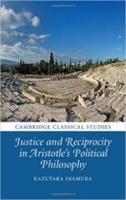
CUP (2015) h/b 255pp £64.99 (ISBN 9781107110946)
Although he was born 2400 years ago this year, Aristotle continues to be a fertile source of new thinking. In the last forty years, philosophers of a liberal and democratic persuasion have invoked his name for a range of theories. In fact, it turns out that this tradition gets Aristotle wrong. For he is no liberal and he has no interest in inalienable human rights. Instead, I. argues, Aristotle is firmly wedded to an aristocratic outlook: the key idea is that in general we should distribute things, including the right to participate in government, to the persons or groups most suitable for them rather than on the basis of equal rights.
Aristotle’s approach is to combine the aristocratic principle that we should be governed by the best people (this is, after all, what is meant by aristocracy) with an argument that the multitude does indeed have a virtuous character (the wisdom of the crowd). As a result he concludes that the fundamental requirement is the fair distribution not of benefits (a peculiarly modern obsession) but of political responsibilities. In this sense Aristotle can be called an egalitarian, but his egalitarianism consists in the demand that all members of the political community should acquire practical wisdom and the belief that this is best achieved if citizens govern and are governed in turn: the essence of citizenship is participation in politics rather than free birth (although Aristotle has a pessimistic view of the potential of craftsmen, merchants, and farmers to perform this role).
I. insists that, if such an approach were taken more seriously, the result would actually be an improvement in the functioning of modern democracies particularly at a local level. A society in which everyone enjoyed the reciprocal equality of governing and being governed would help to create a cooperative and friendly relationship between its citizens. Because the need to participate would encourage people to develop their faculty for practical reasoning, it would counteract the oligarchic tendencies inherent in the modern state where a separate political class has emerged to dominate or compete for public office.
In an age where political apathy is widespread, I recommend this attempt to reconnect with the fountainhead as a valuable contribution to the debate.
Alan Towey
